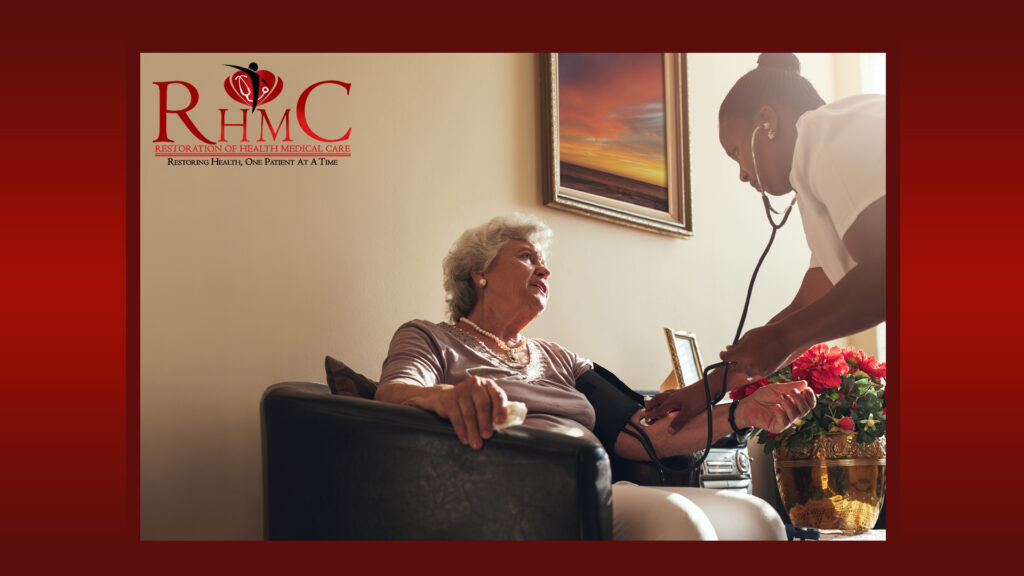1510 N. Hampton Rd., Suite 260
DeSoto, Texas 75115
Phone Number 972-863-7033
Welcome to
Restoration
of Health Medical Care, PLLC

You Are Our Top Priority
Mission Statement
Our mission is to provide medical house call visits to every senior citizen or disabled person in the Dallas/Fort Worth Metroplex who is not able to visit their regular primary care provider (PCP)…
Providing You with Quality Care to Restore Your Health
As your trusted provider of medical house call services, we offer professional care to help you restore your health. Our team guarantees that you will be well taken care of, anytime and anywhere. Feel free to call us today!
Our Medical Services
Insurance Accepted
Get to know the types of insurance plans we accept.
Restoration of Health Medical Care believes in affordable and efficient health care for all. Thus, our team accepts the following forms of payment for our patients’ convenience:
AARP is an interest group in the United States focusing on issues affecting those 50 and older.
Plans through work, Individual & Family Plans, Medicare Plans, Medicaid Plans, Dental Plans, and Student Health Plans.
BCBS is a United States–based federation with 33 independent and locally operated BCBSA companies that provide health insurance to more than 115 million people in the U.S.
is a United States–based federation with 33 independent and locally operated BCBSA companies that provide health insurance to more than 115 million people in the U.S.
GEHA (Government Employees Health Association) is an American self-insured, not-for-profit association providing medical and dental plans to federal employees and retirees and their families through the Federal Employees Health Benefits (FEHB) program and the Federal Employees Dental and Vision Insurance Program (FEDVIP).
Medicaid in the United States is a federal and state program that helps with medical costs for some people with limited income and resources. Medicaid also offers benefits not normally covered by Medicare, including nursing home care and personal care services. The Health Insurance Association of America describes Medicaid as “a government insurance program for persons of all ages whose income and resources are insufficient to pay for health care.” Medicaid is the largest source of funding for medical and health-related services for people with low income in the United States, providing free health insurance to 74 million low-income and disabled people as of 2017. It is a means-tested program that is jointly funded by the state and federal governments and managed by the states, with each state currently having broad leeway to determine who is eligible for its implementation of the program. As of 2017, the total annual cost of Medicaid was just over $600 billion, of which the federal government contributed $375 billion and states an additional $230 billion. States are not required to participate in the program, although all have since 1982. Medicaid recipients must be U.S. citizens or qualified non-citizens, and may include low-income adults, their children, and people with certain disabilities. Poverty alone does not necessarily qualify someone for Medicaid.
Medicare is a national health insurance program in the United States, begun in 1966 under the Social Security Administration and now administered by the Centers for Medicare and Medicaid Services. It primarily provides health insurance for Americans aged 65 and older, but also for some younger people with disability status as determined by the Social Security Administration, as well as people with end stage renal disease and amyotrophic lateral sclerosis.
“Private Pay” is the term used to identify those patients whose costs are NOT covered by a government program, such as Medicare or Medicaid. Private pay can mean a person is paying for services themselves (private pay), or it can mean that a patient has commercial insurance and is having to cover some of the costs themselves (out-of-pocket). The costs for home health care vary significantly depending on the type of insurance you have. Your benefits will be verified prior to a home health admission and details of charges will be provided to you, in writing. Be sure to understand what your “out-of-pocket” costs might be by consulting your insurance company prior to admission.
WellMed is a comprehensive network of doctors, specialists, and medical professionals dedicated to caring for over 1 million older adults across more than 16,000 offices in Texas and Florida.
UnitedHealthcare is an operating division of UnitedHealth Group, the largest single health carrier in the United States.
Home Health Referrals
Do you know someone who needs our services? Refer them to us!
We offer our services to every person in need. Call us today to enjoy our care!
Home Visits
Meet with our professionals and let them assess your care needs today!
Learn more about the levels of care that we can bring to your home.
Office Visits
Come and visit with us for discussions about new or existing health problems.
Our goal is to determine what is or may have occurred within your body.
1510 N. Hampton Rd., Suite 260
DeSoto, Texas 75115
Phone Number 972-863-7033